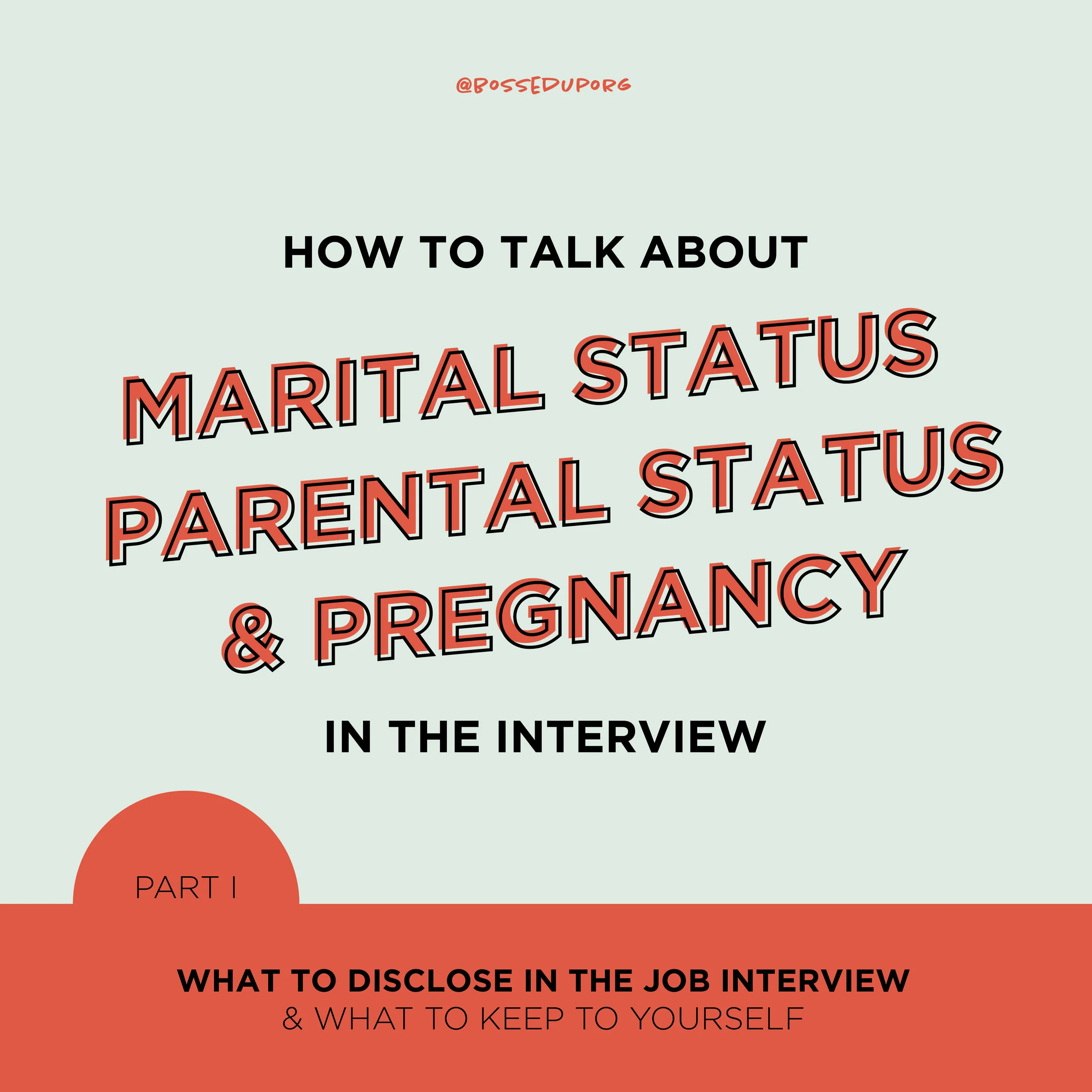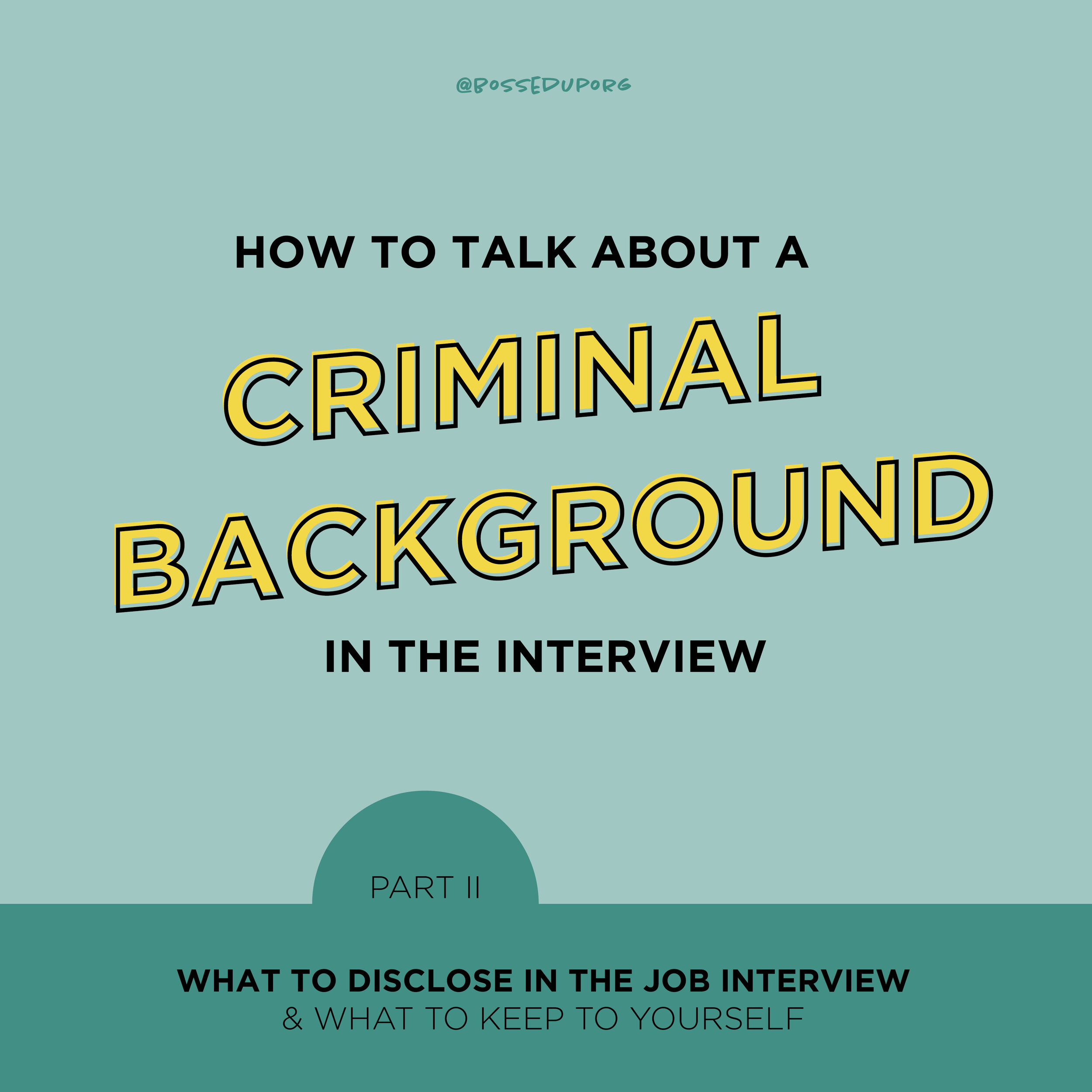How to Talk About Marital Status, Parental Status, and Pregnancy in the Interview
Series: What to Disclose in the Job Interview & What To Keep to Yourself
Episode 311 | Author: Emilie AriesInspired by a question that came up recently in the Courage Community on Facebook, we were debating when it makes sense to make certain disclosures while interviewing for a new job.
Today I want to address when to bring up pregnancy in the interview process - and all kinds of other disclosures that might warrant proceeding with caution. How about disclosing a disability, your sexual orientation, a chronic illness, or criminal background? We’re going to talk all of these through in detail to explore how to balance the desire to demonstrate honesty and transparency with self-protection and knowing your rights.
A big disclaimer before we dive in: all of the following disclosures are much easier to make with a prospective employer once you’ve successfully secured a written job offer. At that point, you’re more protected from the offer being rescinded, because if the offer is revoked in light of your disclosure, that employer opens themselves up to potential liability in the form of a hiring discrimination case. Of course, proving discrimination is an extremely difficult, long, and expensive legal process, and we know hiring discrimination happens every day in America, where worker’s rights have been systematically eroded in recent years. So you still need to proceed with caution - and this is a good reminder that we should all be advocating more for worker’s rights, workplace protections, and anti-discrimination laws on the state and federal level.
Marital Status
Being asked about marital status might seem innocuous to the oblivious interviewer who let’s a personal question like this one slip, but it’s an absolute red flag. This sets up all kinds of potential discomfort and discrimination, especially for LGBTQ+ job-seekers who may essentially have to out themselves in answering this question.
If you’re a woman in your 30’s and the interviewer asks what your husband does, they’re making robust assumptions about your sexual orientation and marital status that can immediately exclude all kinds of employees.
If you’re planning an upcoming wedding, that might be seen as a potential time commitment that conflicts with work. Or worse yet, if you disclose that you recently tied the knot, employers may make assumptions about your plans to become pregnant in the near future, which again, for women, is too often seen as a distraction from work. Basically, this question about marital status is more of a minefield than it might appear at first glance, so it’s better to avoid disclosing anything much about your marital status if it doesn’t pertain to your ability to get the job done.
Parental Status
I’ve written extensively about this question in a past post - Should You Mention Your Kids In the Interview? - and I’ll sum up my biggest take-aways again here.
The “Motherhood Wage Penalty” is a well-documented phenomenon. Across the board, managers are more likely to see moms as a potential liability, despite a growing body of evidence that shows mothers are actually some of the most efficient workers in the workforce.
One study found:
“Mothers were judged as significantly less competent and committed than women without children… Mothers were also held to harsher performance and punctuality standards. Mothers were allowed significantly fewer times of being late to work, and they needed a significantly higher score on the management exam than non-mothers before being considered hirable.”
Fatherhood, on the other hand, actually results in what’s known as the “Fatherhood Bonus.” Employers are actually more likely to perceive fathers as grounded, stable, providers, who warrant a higher starting salary than their single, child-free counterparts.
Bottom line: there’s a pretty compelling case in the research to keep the topic of kids off the table if you’re a woman, and to flaunt whatever family you’ve got if you’re a man. Is this double-standard fair, right, or just? Hell, no. But we’re up against a millennium of unconscious gender stereotyping here.
Worried the employer you’re interviewing with doesn’t have family-friendly policies? Ask about what normal business hours are expected in your role. Ask about the overall company culture. You can even ask to take a peek at the employee handbook, which should include many more details on the company’s policies and procedures, like parental leave and other available benefits. If you have specific accommodations in mind that you’ll need in order to accept the position, wait until you’re in the negotiation phase (after a written offer is made) to ask for the flexibility you need.
Pregnancy
Should you disclose your pregnancy during the interview? If you ask a dozen women this question, you’ll likely get a dozen different answers. The way I see it: it all depends on your own personal risk tolerance and how far along you are in your pregnancy. If you’re showing and interviewing in person, you don’t have much of an option anyway.
But if you’re able to avoid it, Georgene Huang, co-founder of FairyGodBoss, who was laid off at two months pregnant and interviewed for new jobs throughout her pregnancy, recommended on a recent podcast interview to stay off the topic if you can.
Keeping your pregnancy to yourself is not dishonest, so long as it doesn’t pertain to your specific role. If you’re being hired to take the lead on a project that culminates right around your due date, then your own personal calculation might be different and disclosing might feel like the most honest path forward for you.
At the end of the day, you have to consider your own personal options. How badly do you need this job? How optimistic are you about your ability to secure another offer? If you have interviews going with multiple employers who seem eager to offer you a position, it’s less of a risk for you to disclose your pregnancy early and gauge the response you get from both prospective employers as a part of weighing your options.
TaRhonda Thomas, a journalist and news anchor, shared with me on an early podcast interview how completely transparent she was about the accommodations she needed as a new mom interviewing with plans to have more children in the near future, too. She was totally up-front about the demands she had from her next employer, while standing confidently in the skills and experiences she was bringing to the table as well. As someone who was returning to work after a period of time where she stayed home with her newborn full-time, she set a high bar for her next job to meet in order to set herself up for long-term sustainable success.
Whatever path you choose, know that there’s no single “right” answer. Rather, it’s a personal reflection of your own risk tolerance and ability to negotiate whatever accommodations you may need.
If you want to inquire about the prospective employer’s parental leave policies and overall family-friendliness, check out sights like FairyGodBoss.com or InHerSight.com to read anonymous reviews of companies that relate to women’s long-term growth potential. You can always ask to take a peek at the employee handbook, too, which should include many more details on the company’s policies and procedures.
Interested in more? Here are THE OTHER 4 parts of the series:
Got a career conundrum you want Emilie to cover on the podcast? Call and leave us a voicemail NOW at 910-668-BOSS(2677).















